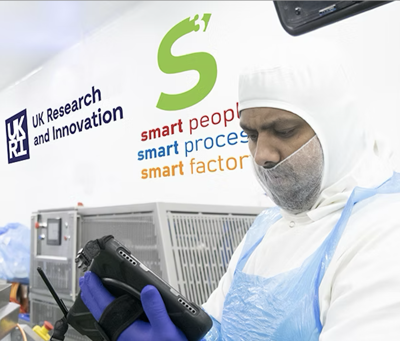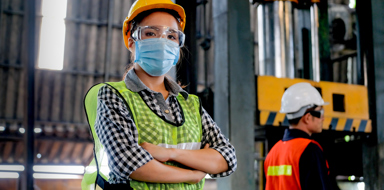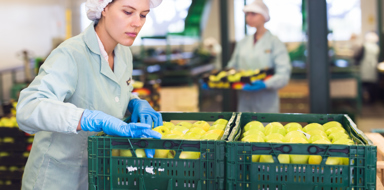
Raynor Foods, a second-generation family business based in Chelmsford, collaborated with Software Imaging, the Universities of Cambridge and Lincoln, on a collaborative R&D project backed by Made Smarter Innovation.
The project, Smart People, Smart Process, Smart Factory (S3), integrates AI, digital twins, and real-time location tracking with a gamified interface. Staff actions that cut emissions - such as reducing overproduction, waste per pack and electricity per pack - are tracked and rewarded, aligning personal, business, and environmental goals.
Innovation Case Study - Raynor FoodsRaynor has already reduced energy use and emissions by 19%, removing over 400 tonnes of CO₂e—the equivalent of 1.4 million cheese sandwiches.
To scale the success, the team has launched a new venture to deploy S3 across UK manufacturing.
Chris Needham, Innovation Lead for Made Smarter Innovation, said: “S3 is a brilliant example of how digital innovation and people-first thinking can combine to transform manufacturing. Raynor’s project shows that empowering staff with the right tools and insights doesn’t just cut emissions—it drives productivity, culture change, and real commercial returns.”
The Inspiration
The UK’s food and drink sector—its largest manufacturing industry—accounts for 20% of national emissions. Most businesses in this SME-dominated sector lack the tools to measure, manage, and meaningfully reduce their footprint. Sandwich production is especially resource-intensive, with 95% of producers struggling to meet decarbonisation targets.
Raynor, having already explored blockchain-led supply chain transparency via the Digital Sandwich project, wanted to go deeper—focusing on internal operations and the role people play in achieving net zero manufacturing.
The Innovation
At the core of S3 is the belief that people, not just technology, drive meaningful change. Built on the principle that what benefits staff can also benefit the business and the planet, the team created a gamified digital twin of the factory to monitor resource use in real time and reward carbon-saving behaviours.
Designed to be SME-friendly, the system avoids costly licences and complexity. A high-precision Ultra-Wideband Real Time Location System (RTLS) provides centimetre-level tracking of people and assets. This data feeds into an integration layer—nicknamed Bernard—which connects legacy and new systems to generate actionable insights.
Every factory process is sub-metered and linked to individual or team KPIs. Staff wear “game links” to track positive actions and earn points. An AI engine powers real-time dashboards, alerts, and rewards.
The Universities of Cambridge and Lincoln helped shape ethical design and communication, ensuring transparency and staff welfare remained central. One early trust-building decision was renaming tracking devices from “tags” to “game links” to avoid surveillance connotations.
Participation is entirely voluntary and positive—staff can only gain points. Rewards include vouchers, holidays, and cash, with a portion of every pound saved contributing to a prize fund.
The rollout was gradual. Initial sceptics helped shape KPIs and address privacy concerns, building ownership and trust. Today, the factory operates on a management-by-exception model, where issues are flagged and addressed in real time.
Behind the scenes, AI-powered Semi-Autonomous Managed Systems (SAMS) optimise everything from forklift movements to refrigeration, learning from live and historic data. The result is a modular, scalable, people-centred ecosystem that has turned the factory into a 'living lab' for net zero innovation.
Martin Bonner, Global Sales Director for Software Imaging, said: “Companies think adopting new tech means scrapping what they have. But often, the existing tech is fine—it just needs to work better for their goals. That’s exactly the approach we took with Raynor.”
The Impact
In just seven months, S3 has delivered measurable results across energy use, emissions, productivity, and culture.
Raynor has reduced energy use and carbon emissions by 19%, with a clear path to 30% by year end. This has eliminated over 400 tonnes of CO₂e and delivered up to £50,000 in monthly savings.
Despite a 30% increase in production, energy use has remained stable thanks to improved monitoring and process efficiency. One key achievement has been reducing the factory’s energy baseline from 81% to 65%, enabled by detailed sub-metering and smarter scheduling.
Labour efficiency is up 9%, with downtime minimised through real-time tracking. Overproduction has fallen by 93%, and total food waste is down by 1.2%.
Throughput has improved across all lines: salad lines by 10 products per minute (PPM), skillet lines by 2 PPM, and flow-wrapped lines by 3 PPM. Picking processes are now 50% faster and 75% more accurate, cutting fulfilment time and reducing errors.
Engagement has been exceptional. The gamification programme sees 95% weekly participation, with staff actively suggesting new KPIs to track their contributions. The system has fostered a shift in mindset: new recruits reference the game in interviews, and internal departments outside the project’s scope have started adopting the approach via shared KPIs.
Administrative tasks have also been transformed. Time spent on ‘Time and Attendance’ management has dropped by 80%, freeing HR and team leaders to focus on higher-value work.
Tom Hollands, Innovation and Technical Director at Raynor Foods, said: “We’ve effectively turned the factory into a computer game—one that staff play against climate change. But it’s not the tech that has moved the needle, it’s the people. You can throw digital tools at a problem, but unless you give people the right information and a reason to care, nothing changes. S3 is about aligning what’s good for staff, good for the business, and good for the planet. That’s when the real shift happens.”
“The wider outcome is not just a digital twin—it’s a digital culture. The project has shown that even complex food manufacturing environments can become net zero testbeds when people are empowered with the right information, tools, and incentives.”





